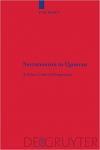Sectarianism in Qumran: A Cross-Cultural Perspective

Sectarianism in Qumran: A Cross-Cultural Perspective explores the sectarian characteristics of the system of beliefs and laws of the two major Qumran sects of the Dead Sea Scrolls, the yahad and the Damascus Covenant, using theories of sectarianism and related topics in sociology, anthropology and the study of religion. It discusses Qumranic moral and purity boundaries, cultic rituals, wealth, gender, atonement, revelation mysticism, structure and organization and compares them with those of seven sects of the same (introversionist) type: the early Anabaptists, Mennonites, Hutterites and Amish, Puritans, Quakers and Shakers. The sociological and historical relationship between the Qumran sects and the related movements of 1 Enoch, Jubilees and the Essenes are analyzed in detail, in order to understand the socio-religious background of sectarianism in Qumran and its subsequent variations. Throughout the chapters, differences between the yahad, the Damascus Covenant and the Essenes are observed in relation to social boundaries, social structure, gender relations, revelation and inclination towards mysticism. Points of resemblance and difference are traced between the Qumran sects and the early-modern Christian ones, and several different patterns of sectarian ideology and behavior are noticed among all these sects.
2007, De Gruyter, 438 Pages
Last Updated Date : 31/07/2022



